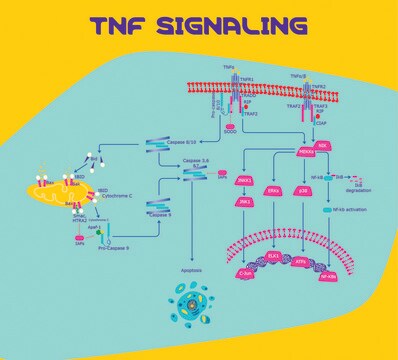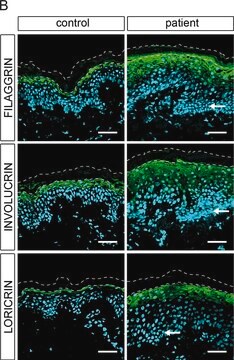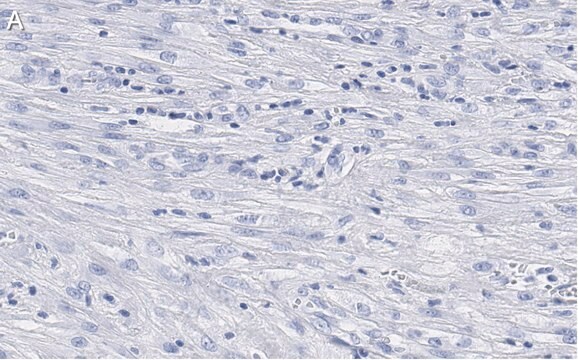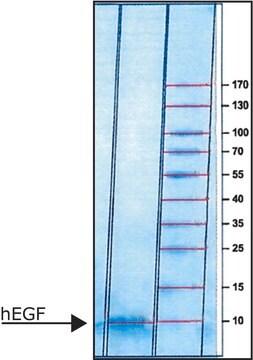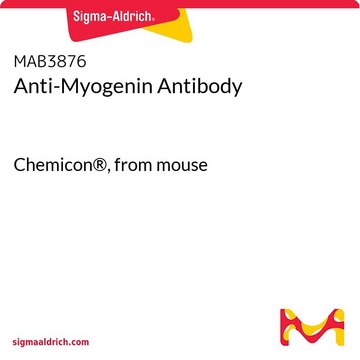ZRB1399
Anti-Involucrin Antibody, clone 1D13 ZooMAb® Rabbit Monoclonal

recombinant, expressed in HEK 293 cells
About This Item
Prodotti consigliati
Origine biologica
rabbit
Livello qualitativo
Ricombinante
expressed in HEK 293 cells
Coniugato
unconjugated
Forma dell’anticorpo
purified antibody
Tipo di anticorpo
primary antibodies
Clone
1D13, recombinant monoclonal
Descrizione
recombinant, expressed in HEK 293 cells
Nome Commerciale
ZooMAb® learn more
Forma fisica
lyophilized
PM
calculated mol wt 64.48 kDa
observed mol wt ~120 kDa
Reattività contro le specie
human
Confezionamento
antibody small pack of 25 μL
Caratteristiche più verdi
Waste Prevention
Designing Safer Chemicals
Design for Energy Efficiency
Learn more about the Principles of Green Chemistry.
Convalida avanzata
recombinant expression
Learn more about Antibody Enhanced Validation
sustainability
Greener Alternative Product
tecniche
affinity binding assay: suitable
immunocytochemistry: suitable
immunohistochemistry (formalin-fixed, paraffin-embedded sections): suitable
western blot: suitable
Isotipo
IgG
Sequenza dell’epitopo
N-terminus
N° accesso ID proteina
N° accesso UniProt
Categoria alternativa più verde
, Aligned
Condizioni di spedizione
ambient
Temperatura di conservazione
2-8°C
modifica post-traduzionali bersaglio
unmodified
Descrizione generale
Each ZooMAb® antibody is manufactured using our proprietary recombinant expression system, purified to homogeneity, and precisely dispensed to produce robust and highly reproducible lot-to-lot consistency. Only top-performing clones are released for use by researchers. Each antibody is validated for high specificity and affinity across multiple applications, including its most commonly used application. ZooMAb® antibodies are reliably available and ready to ship when you need them.
Learn more about ZooMAb here.
Specificità
Immunogeno
Applicazioni
Evaluated by Western Blotting in Jurkat cell lysate.
Western Blotting Analysis: A 1:1,000 dilution of this antibody detected Involucrin in Jurkat cell lysate.
Tested applications
Western Blotting Analysis: A 1:1,000 dilution from a representative lot detected Involucrin in Human skin and A431 cell lysates.
Affinity Binding Assay: A representative lot of this antibody bound recombinant human Involucrin fragment with a KD of 1.0 x 10-12 in an affinity binding assay.
Immunohistochemistry (Paraffin) Analysis: A 1:1,000 dilution from a representative lot detected Involucrin in human esophagus tissue sections.
Immunocytochemistry Analysis: A 1:100 dilution from a representative lot detected Involucrin in MCF-7 cells.
Note: Actual optimal working dilutions must be determined by end user as specimens, and experimental conditions may vary with the end user
Descrizione del bersaglio
Stato fisico
Ricostituzione
Stoccaggio e stabilità
Note legali
Esclusione di responsabilità
Non trovi il prodotto giusto?
Prova il nostro Motore di ricerca dei prodotti.
Codice della classe di stoccaggio
11 - Combustible Solids
Classe di pericolosità dell'acqua (WGK)
WGK 1
Punto d’infiammabilità (°F)
Not applicable
Punto d’infiammabilità (°C)
Not applicable
Certificati d'analisi (COA)
Cerca il Certificati d'analisi (COA) digitando il numero di lotto/batch corrispondente. I numeri di lotto o di batch sono stampati sull'etichetta dei prodotti dopo la parola ‘Lotto’ o ‘Batch’.
Possiedi già questo prodotto?
I documenti relativi ai prodotti acquistati recentemente sono disponibili nell’Archivio dei documenti.
Il team dei nostri ricercatori vanta grande esperienza in tutte le aree della ricerca quali Life Science, scienza dei materiali, sintesi chimica, cromatografia, discipline analitiche, ecc..
Contatta l'Assistenza Tecnica.